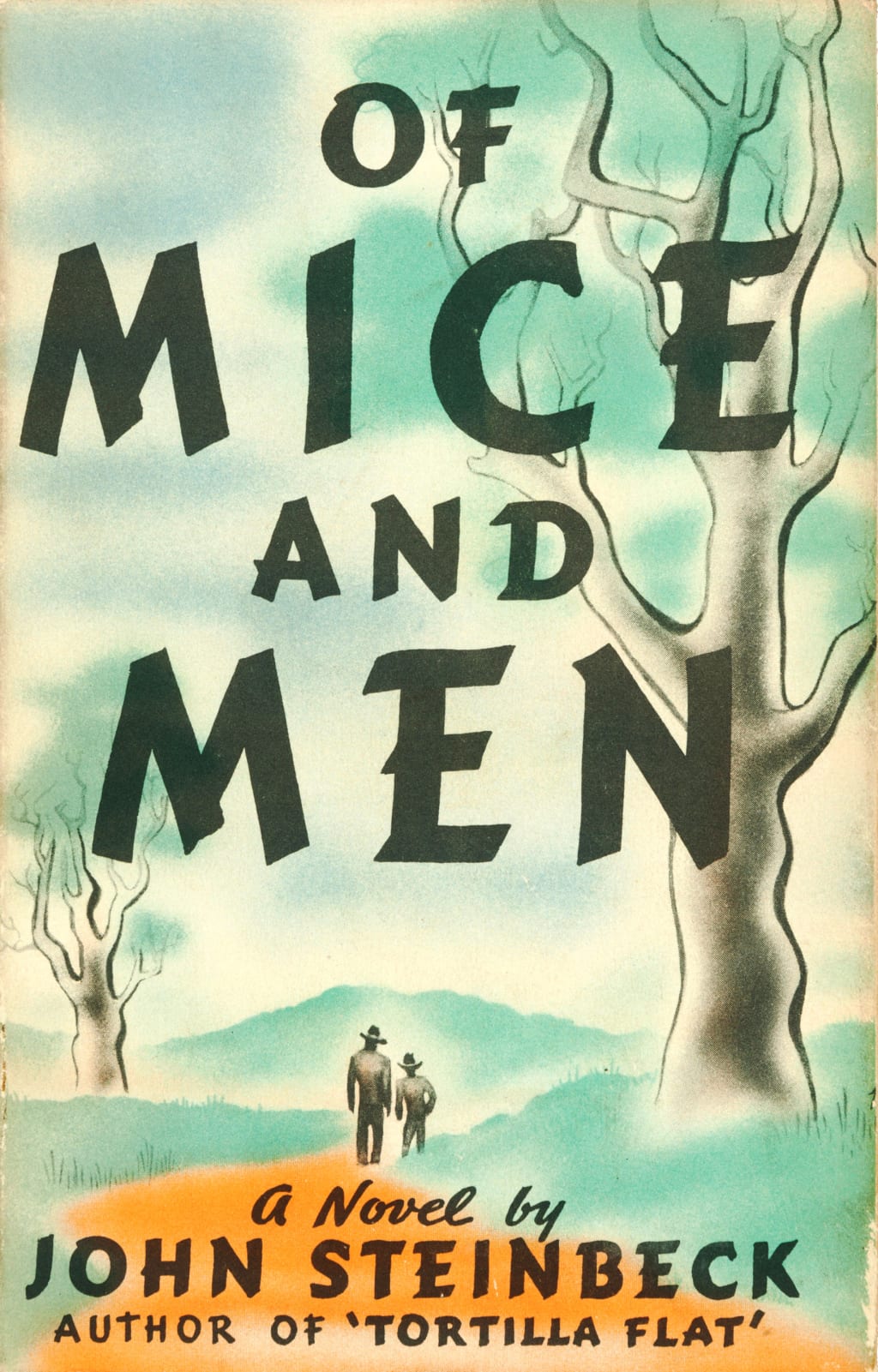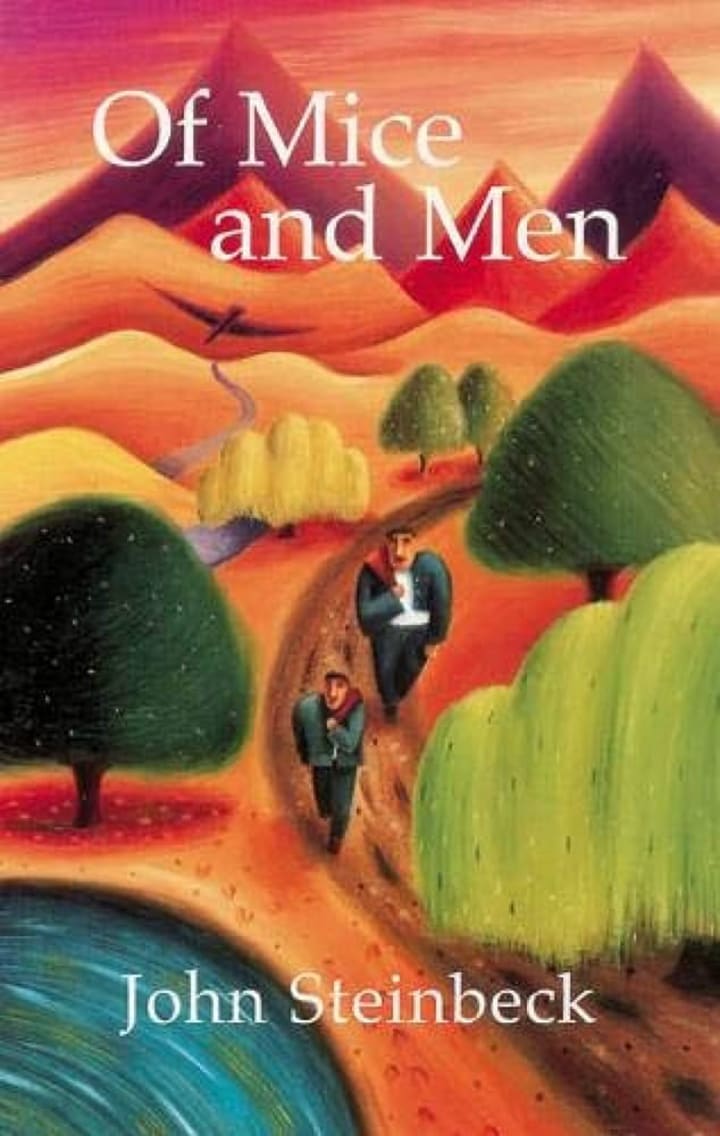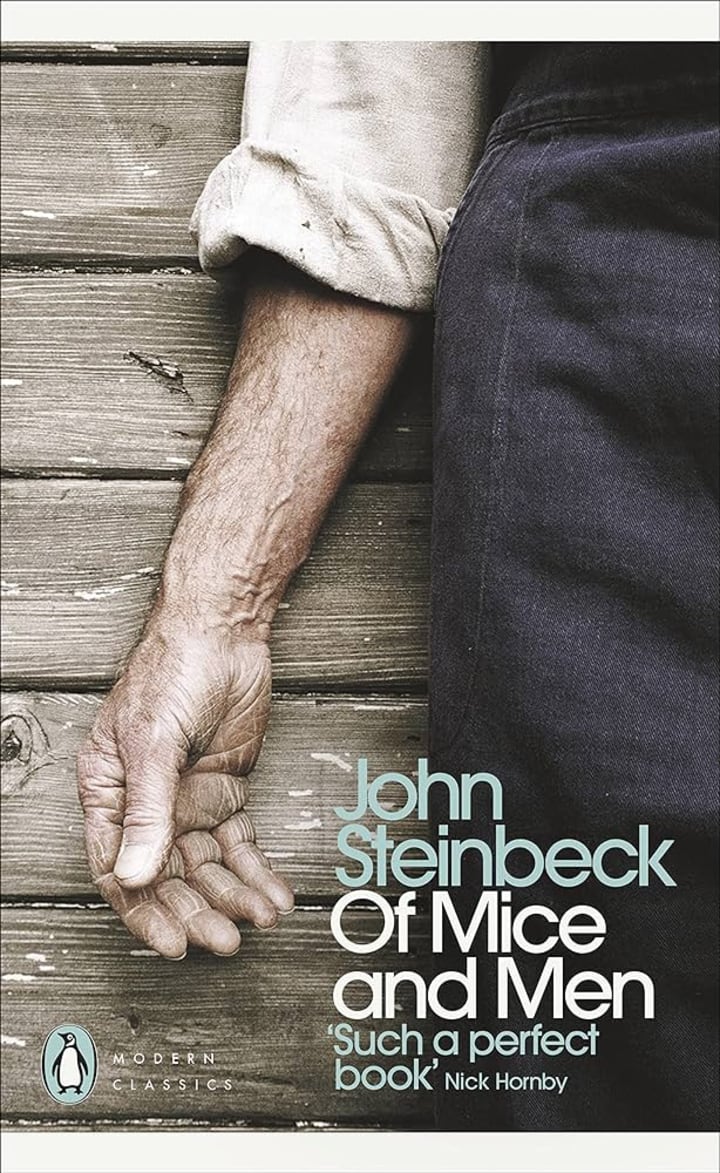Of Mice and Men by John Steinbeck
Why It's a Masterpiece (Week 1)

“Jesus, I seen it happen too many times. I seen too many guys with land in their head. They never get none under their hand.”
- Of Mice and Men
‘Of Mice and Men’ is a book that has been revered by almost everyone I have met that has read it. By those who have not, they have been told ad nauseam and endlessly that they should be reading it. It is not that long and it has a lot to give. Published in 1937, it deals with some really difficult themes and messages about the Great Depression as experienced by two men who work on farms in Salinas Valley, California. Now, as Steinbeck is known for writing about California, in nothing apart from ‘The Grapes of Wrath’ does he get this dark and intense.
The first time I read this was at school. We were studying it. You read that correctly - if you know, you know. Steinbeck’s writing style suits the way this book unfolds: many of the characters have some sort of discernible character flaw, they speak in dialect and they have a lot less to give than they think or hope to. It is truly a tragic story filled with remorse and guilt but most importantly, it deals with some real issues that were silent in the times of the Great Depression - especially concerning the character of Lennie.
The Plot

It is about two men, one named George and the other named Lennie. George is the power player though he is the physically smaller one and Lennie is a gentle giant with some kind of unnamed mental disability. After getting jobs on a ranch in Salinas Valley, California, the men feel themselves to be really lucky. They meet characters like Slim - the charming ranch-hand who has a spike for casual racism. They meet Candy, the old guy who has a disabled dog. They meet Curley - the boss’s son and a mean human being. Curley’s married to a woman only known as Curley’s Wife.
As they start working on the ranch they witness the choices that must be made, the things that people have to do to keep their jobs. George and Lennie ultimately have a choice of their own and it will come down to the wire before anyone does anything about it. The ending is simply earth-shattering. I am sure that if you read it, you won’t be able to get that final image out of your mind.
Into the Book
There are many great themes in this book that are relative to the era of the Great Depression and what impact it had on the common man. For example: there is the theme of loss that permeates throughout the book until the very last page. This theme of loss starts and ends the book in the most symbolic way of telling what is more important to these people, especially George, at any particular time. There are many quotations that feel like they get in touch with this embedded loss in many different ways and, it is not just George feeling that loss. Everyone in this book has some kind of story about how loss has permeated their lives and sent them here, together, at this space and time.
The Great Depression is one of the things that connects all these people’s loss together like a thread woven for doom. After this loss there is almost a resentment that pulls the characters into anger against the fact that they were once taught that they would own land and be rich. It stirs this hatred for characters like Curley and Curley’s Wife, who are the ‘haves’ in the group of ‘have nots’.
“Just like heaven. Ever’body wants a little piece of lan’. I read plenty of books out here. Nobody never gets to heaven, and nobody gets no land. It’s just in their head. They’re all the time talkin’ about it, but it’s jus’ in their head.”
- Of Mice and Men.
Another theme that gets explored is the theme of death and grief. Be forewarned about this book because it can get difficult and tragic to read for those who are emotional. Some people are driven to the lands of Salinas Valley, California not because of any loss of money but instead because of the grief that they could no longer deal with. Some of them only stay because they have people who they later will not have. There is a sense of awe that you feel when Candy makes the ultimate decision and we see one of the most harrowing scenes in any of Steinbeck’s fiction. Sometimes, it does not feel like fiction though. It has its own way of morphing into our understanding of the reality of the Great Depression. If there was not a need, not a requirement to keep someone/something then they would have to be let go. It is a foreshadowing of things that will happen later on, something that everyone eventually regrets but is best for the moment. It is a requirement over a want. It is a fatal decision that gets made at a particular time. It is the grief afterwards that the characters struggle with. They must, by all means, push it down.
“I ought to of shot that dog myself, George. I shouldn't ought to of let no stranger shoot my dog.”
- Of Mice and Men.
One more theme that is explored in detail is the theme of friendship. There is a great deal of friendship in this book that fills the book with a sense of belonging amongst the ranch hands even though George and Lennie have only just turned up. The friendship aspect though, is not extended to those of a different race. As you read the book you notice that there is only one Black character and Steinbeck makes a point of the casual racism amongst the White men being a character fault.
Apart from this though, there seems to be a sense of togetherness amongst the men who work on the ranch. Despite their differences, and there are many, they tend to not only get along but, are realistic with each other. Only the ‘haves’ such as Curley and his wife are left out of the group in reality. Even the Black character is treated with more belonging in some respects. There is a clear line between people with Slim being at the top of this hierarchy of friends and having the most say on to who is ‘in’ and who is ‘not. It is here where we see Slim’s hatred for Curley and his Wife and, his casual racism. Though he presents character faults and there is a sense of equality and belonging on the ranch, there is still a hierarchy in which Slim is listened to more than any other character. Friendship is therefore a key theme not just to show us how people stick together in this book but also how they maintain some sort of microcosm of society within their work and lives.
“A guy needs somebody―to be near him. A guy goes nuts if he ain't got nobody. Don't make no difference who the guy is, long's he's with you. I tell ya, I tell ya a guy gets too lonely an' he gets sick.”
- Of Mice and Men.
Other key themes from this book include treatment of ‘others’, the presentation and oppression of women, the resentment of idealism and loneliness. Each one is explored in context of character and time with every main theme linking back to the realistic understanding of the Great Depression and its working class heroes. The real question I have always had is whether the ending is George’s demonstration of what true friendship looks like.
Why It’s a Masterpiece

On the front cover of the Penguin Modern Classics edition of this novel, Nick Hornby calls ‘Of Mice and Men’ a perfect book and honestly, it probably is not the most perfect book ever written but it comes pretty close to being a perfect book. Not only do we have the everyman characters but we also have a timelessness that encompasses the book. And if we think that this book is to do with the Great Depression, the fact its timeless makes it even more upsetting.
Parents from the USA and the UK once called for the removal of this book from the school curriculum and yet, in some cases it made the book even more popular. There was one time where many people read ‘Of Mice and Men’ and many people studied it too. Those days might be gone of studying the book, but there is no question as to why it is a masterpiece. Called ‘too upsetting’, this book depicts very realistic tragedy and does not stall in not giving the reader a closed and happy ending. George and Lennie’s story is one of the most famous in the world for a reason. Steinbeck does not need to create a world of grief because there is one already there for him, around him, one that he lives in. He fills it with characters that, by all means, might actually exist in real life. He leaves nothing to the imagination and stops short of giving us a closed narrative, letting it continue long after the book is over. It is one of the best things about this book. The words may no longer fill the pages as the story we know is over, but the story of the ranch is not - it is written as if it were to continue. We just do not know what happens afterwards.
Another reason why it is a masterpiece is because of the way it is written. There is no flowery language and, in classic Steinbeck style which Hemingway would copy like-for-like afterwards, there are not many adverbs. The long descriptions are plain and it makes us consider the lack of emotion as an emotion. The lack of connection to the material world becomes its own feeling and we realise through these descriptions just how little these people actually have in terms of ‘stuff’ and ‘money for stuff’. They live in the place they work and so, even though they should grow a connection to the place, they do not. Their migration is essential to their survival, as is seen at the beginning of the novel. The bland and almost rustic writing style reflects the nature of this survival. It is difficult and discordant and sometimes, it doesn’t make sense why it has to be this way. But it works and that is what matters.
Once a book banned for its profane levels of violence, its suggestive content and derogatory language, this book has become one of the most widely read modern classics of all time because of its ability to give us a sort of inside history to the Great Depression, as if we ourselves are in the barns with the ranch hands, resentful but still going because we have no choice.
Conclusion
In conclusion, I would say that the main reason why ‘Of Mice and Men’ is considered a classic is because of its hyper-realistic depictions of the resentment towards the middle and upper classes felt amongst the working class during the Great Depression and the fact that it does not hold back on its acts of requirement. Doing what is required is a far more frequent ordeal that doing what someone feels like in this book and it is almost always seen as something that is not just not wanted, but something that is done with ultimate amounts of hesitation. A parable of the Great Depression and all of its harshness, it depicts not only the realities of the time but a story that could resonate with so many people who had experienced similar things, people who were in those similar situations and even today, people who find themselves at the cusp of those horrors too. Personally, this book has been with me since I first read it. Even small parts of the story that seem not to add to the themes or characters have not been forgotten and, when a book does that, you know it is something special.
Next Week: Lord of the Flies by William Golding
About the Creator
Annie Kapur
200K+ Reads on Vocal.
Secondary English Teacher & Lecturer
🎓Literature & Writing (B.A)
🎓Film & Writing (M.A)
🎓Secondary English Education (PgDipEd) (QTS)
📍Birmingham, UK
X: @AnnieWithBooks
Enjoyed the story? Support the Creator.
Subscribe for free to receive all their stories in your feed. You could also pledge your support or give them a one-off tip, letting them know you appreciate their work.
Reader insights
Outstanding
Excellent work. Looking forward to reading more!
Top insights
Compelling and original writing
Creative use of language & vocab
Easy to read and follow
Well-structured & engaging content
Expert insights and opinions
Arguments were carefully researched and presented
Heartfelt and relatable
The story invoked strong personal emotions
Masterful proofreading
Zero grammar & spelling mistakes
On-point and relevant
Writing reflected the title & theme






Comments (1)
I read this while doing my Basic Certificate in the Humanities with the Open University. The main point that stood out to me was how the different classes treated each other and how social adversity caused difficulties among the classes. Racism was another critical topic in this book. Black people seemed to have no voice. It is apparent in the book that they were seen as below class at the time of the great depression; sadly, that still happens today. Reading this book takes a lot of strength because it is a powerful talking book, and some themes are beyond heartbreaking. I enjoyed your book analysis; you are spot-on in your story.